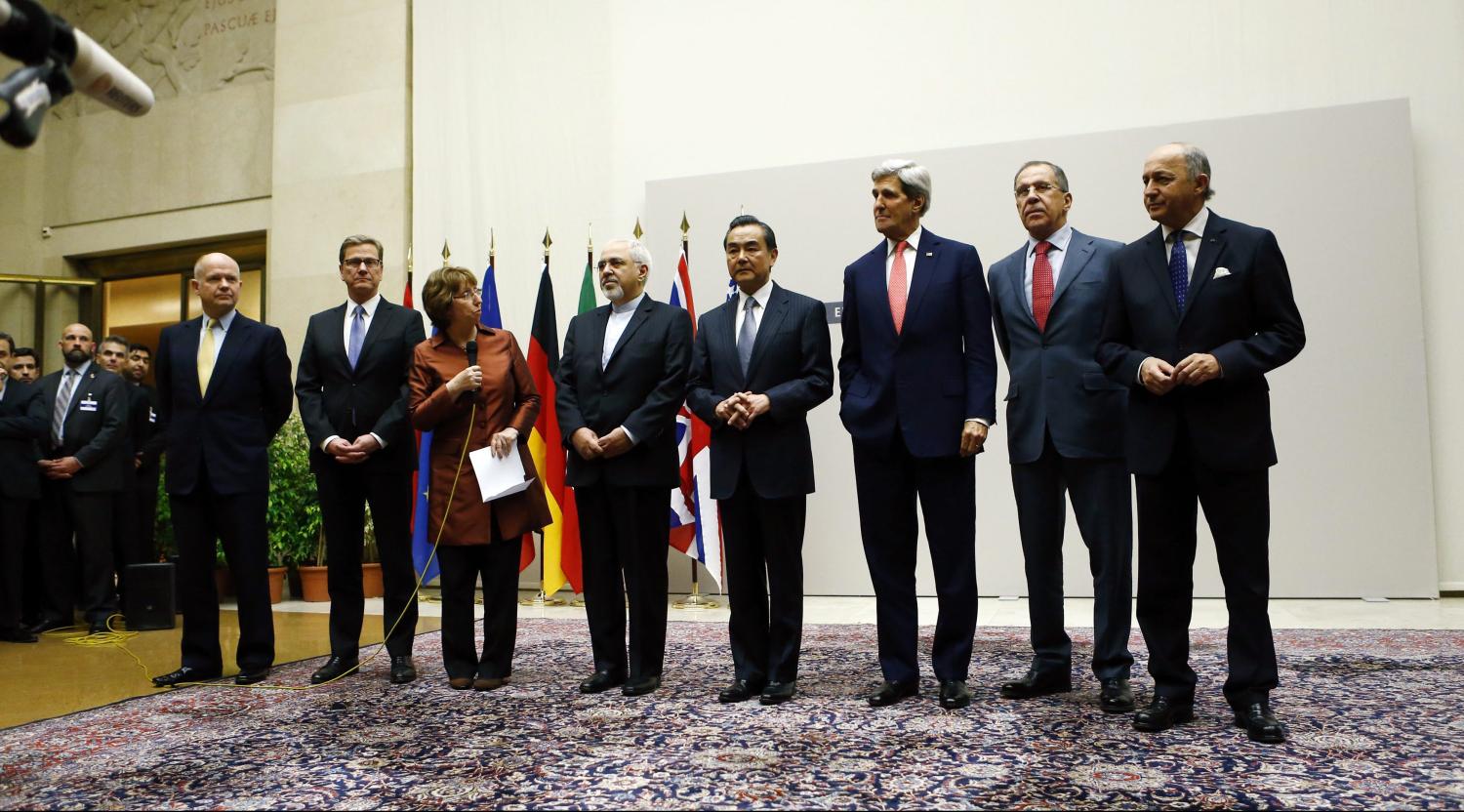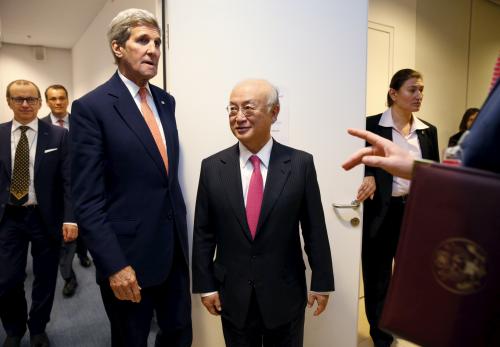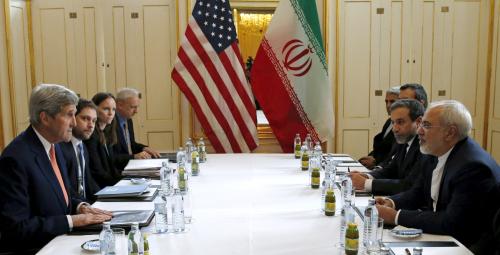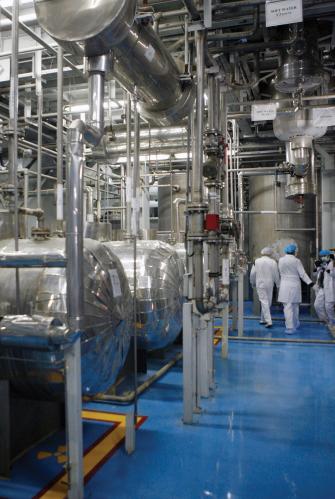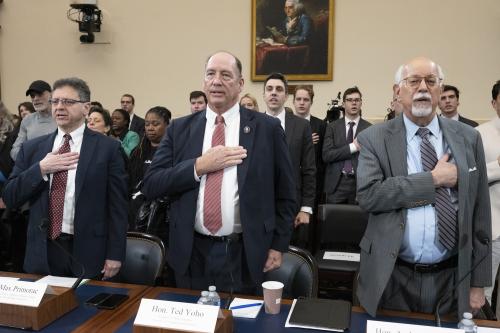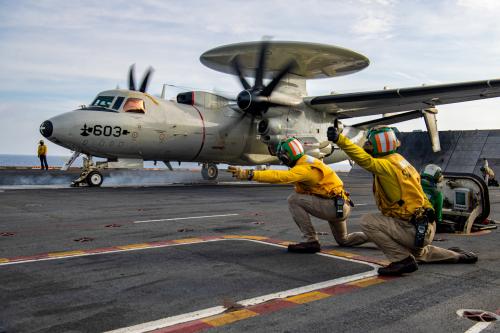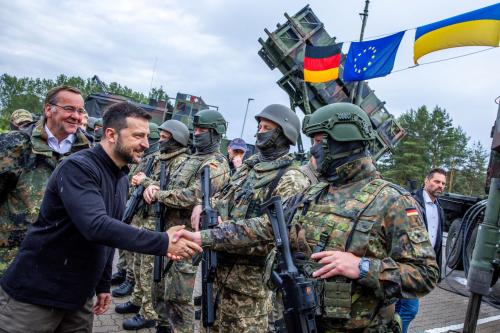The following brief is part of Brookings Big Ideas for America—an institution-wide initiative in which Brookings scholars have identified the biggest issues facing the country and provide ideas for how to address them. (Updated January 24, 2017)
 The nuclear deal between the P5+1 countries (United States, United Kingdom, France, Germany, Russia, and China) and Iran—formally called the Joint Comprehensive Plan of Action (JCPOA)—has functioned well since it was concluded in July 2015. Iran has fulfilled its commitment to sharply reduce, for at least 10 to 15 years, its capacity to produce enough nuclear material for a nuclear weapon. The United States and its P5+1 partners have fulfilled their commitment to suspend the nuclear-related sanctions that had devastated the Iranian economy. But despite the positive record of compliance to date, the JCPOA remains controversial, both in Washington and Tehran, and its future remains uncertain.
The nuclear deal between the P5+1 countries (United States, United Kingdom, France, Germany, Russia, and China) and Iran—formally called the Joint Comprehensive Plan of Action (JCPOA)—has functioned well since it was concluded in July 2015. Iran has fulfilled its commitment to sharply reduce, for at least 10 to 15 years, its capacity to produce enough nuclear material for a nuclear weapon. The United States and its P5+1 partners have fulfilled their commitment to suspend the nuclear-related sanctions that had devastated the Iranian economy. But despite the positive record of compliance to date, the JCPOA remains controversial, both in Washington and Tehran, and its future remains uncertain.
American critics of the JCPOA are concerned that key restrictions on Iran’s nuclear capacity will expire after 15 years, and they blame the JCPOA for Iran’s provocative behavior not covered by the deal, including its role in regional conflicts, missile activities, incarceration of Iranian-Americans, and harassment of U.S. naval vessels. Opponents in Congress have proposed new sanctions legislation that could derail the deal, and presidential candidate Donald Trump and other Republicans call for re-negotiating the deal or scrapping it altogether.
Opposition in Iran is at least as strong. Opponents blame the slow pace of Iran’s economic recovery on what they wrongfully say is a U.S. failure to fully meet its sanctions relief pledge, and they threaten to withhold their own compliance unless the United States does more to encourage international banks and businesses to engage with Iran. And just as U.S. domestic criticism of the JCPOA can be attributed significantly to partisan opposition to the Obama administration and election-year politics, much opposition to the deal in Tehran is a product of the intense struggle between Iranian ideologues and pragmatists and posturing before the 2017 presidential election.
American critics are right that, at least so far, the JCPOA has not moderated Iran’s behavior in areas not covered by the deal. But the JCPOA was never intended to address all troublesome aspects of Iranian behavior. While some U.S. JCPOA proponents probably hoped that the nuclear deal would give a boost to Iranian moderates and help elicit Iranian cooperation in resolving regional conflicts, the JCPOA was not based on optimistic expectations about its impact on Iran’s domestic politics or on Iranian external policies outside the nuclear realm. Instead, it was based on the judgment that eliminating the nuclear threat was the most immediate priority and that a comprehensive agreement dealing with other objectionable aspects of Tehran’s behavior would not have been negotiable. It was also based on the judgment that Iran’s objectionable non-nuclear policies, especially its destabilizing regional activities, could and should be effectively countered by the United States and its partners even as they cooperate with Iran in implementing the nuclear deal.
Those judgments remain sound. The next U.S. administration should support the JCPOA and take steps to ensure that it is strictly enforced, that Iran receives the economic benefits to which it is entitled, and that Iran’s leaders will be deterred from pursuing nuclear weapons after the JCPOA’s key nuclear restrictions expire. At the same time, the next American president should pursue a comprehensive strategy toward Iran and the region that instills confidence in U.S. regional partners that Washington is committed to their security, that pushes back against provocative Iranian behavior while keeping the door open to engagement with Tehran if it is prepared to play a constructive regional role, and that reduces incentives for Iran’s neighbors to pursue nuclear weapons or to become latent nuclear powers by acquiring enrichment or reprocessing capabilities.
While the Obama administration was justified in focusing the JCPOA exclusively on the nuclear issue, sustaining the nuclear deal over the long term will require embedding the JCPOA in a coherent regional strategy that the American public views as meeting the broader challenge posed by Iran and serving the interests of the United States and its friends in the Middle East.
[S]ustaining the nuclear deal over the long term will require embedding the JCPOA in a coherent regional strategy.
Background
Negotiations on the Iran nuclear issue spanned a period of 12 years, with Iran engaging at various stages with three European states (Britain, France, and Germany), the P5+1 and European Union (EU), and crucially the United States (in both secret and openly acknowledged bilateral talks). Concluded on July 14, 2015 between Iran and the P5+1 countries, the JCPOA provided for deep reductions in Iran’s uranium enrichment capacity and the re-design of its Arak plutonium-production reactor, which together effectively block its ability to produce enough nuclear materials for nuclear weapons for at least 10 to 15 years.1 It also called for highly intrusive and unprecedented monitoring measures by the International Atomic Energy Agency (IAEA) capable of providing confidence in Iranian compliance.2 In exchange, U.S., EU, and U.N. Security Council nuclear-related sanctions against Iran would be suspended and eventually terminated.3Strong opposition. The deal encountered vocal opposition in both Washington and Tehran. American opponents criticized the expiration of key nuclear restrictions after 10 and 15 years, questioned whether the monitoring and inspection arrangements were sufficient to detect Iranian cheating, doubted that the United States and its partners would have the will to re-impose sanctions if Iran were caught cheating, and contended that Iran would use the many billions of dollars of restricted assets it would recover under the deal to boost its proxies and further destabilize the region. For their part, Iranian opponents argued that the deal was too restrictive of Iran’s nuclear program, complained that it left too many sanctions in place, criticized the intrusive character of its monitoring measures, and feared that it would open Iran to Western economic and cultural “infiltration” that would undermine the Islamic Republic’s revolutionary values.
Despite contentious public debates, the JCPOA survived parliamentary reviews in both capitals. Although Republicans in Congress opposed the deal, President Obama was able to muster the support of enough Democrats to block a vote on a resolution of disapproval. In Tehran, Supreme Leader Ali Khamenei’s lukewarm endorsement of the deal was sufficient to quiet the objections of Majlis hardliners. And so, with the other P5+1 parties strongly supporting the agreement, the JCPOA took effect.
Positive compliance record. After more than one year since the JCPOA was concluded, all parties appear to be in compliance. In a series of reports, the IAEA maintained that Iran is abiding by its nuclear commitments. Although the Agency discovered in February that Iran possessed slightly more heavy water (0.9 metric tonnes) than the allowed ceiling (130 metric tonnes), Iran corrected the infraction just one week after the overage was identified. While the IAEA apparently has not yet sought access to military or other sensitive facilities, Iran allowed the Agency to conduct “complementary access” inspections at several locations not subject to routine inspections. As expected, the Iranians have sought to interpret the JCPOA in a manner that suits their interests. But whenever such issues have arisen, the United States and its partners have stood firm, and the matter has been satisfactorily resolved. To date, there are no indications that Iran is engaged in covert activities or making preparations to break out of the agreement.
Nonetheless, American critics have been eager to find fault with implementation, usually unfairly. For example, one prominent think tank accused the Obama administration and its P5+1 partners of secretly granting Iran “exemptions” allowing it to retain more enriched uranium than permitted, thereby going along with Tehran’s efforts “to systematically weaken the JCPOA.”4 But the P5+1 countries did not “exempt” enriched uranium that should normally be counted. Instead, they decided that small amounts of enriched uranium embedded in “sludge waste” and other forms of waste material would be exceedingly difficult or impossible to recover and use in a breakout scenario and therefore need not be counted against the 300-kilogram ceiling. While this and similar decisions were not made public—and probably should have been—they were briefed to Congress back in January and did not arouse concerns. Still, JCPOA opponents predictably pounced on the recent “revelation” of these so-called exemptions in their continuing campaign to discredit the nuclear deal.
While Iran’s implementation of its nuclear commitments has gone as well as could be expected, the question of U.S. implementation of its sanctions relief commitments has been much more contentious, especially between Washington and Tehran. Although the United States, European Union, and U.N. Security Council have strictly implemented all the sanctions relief measures required by the JCPOA, the reluctance of major banks and businesses to re-engage with Iran has meant a much slower rate of economic recovery than the Iranian public had been led to expect, and Iranian leaders have taken to accusing the United States, in particular, of dragging its feet on sanctions relief and even pressing international banks and businesses to stay away from Iran, in violation of its JCPOA undertakings.
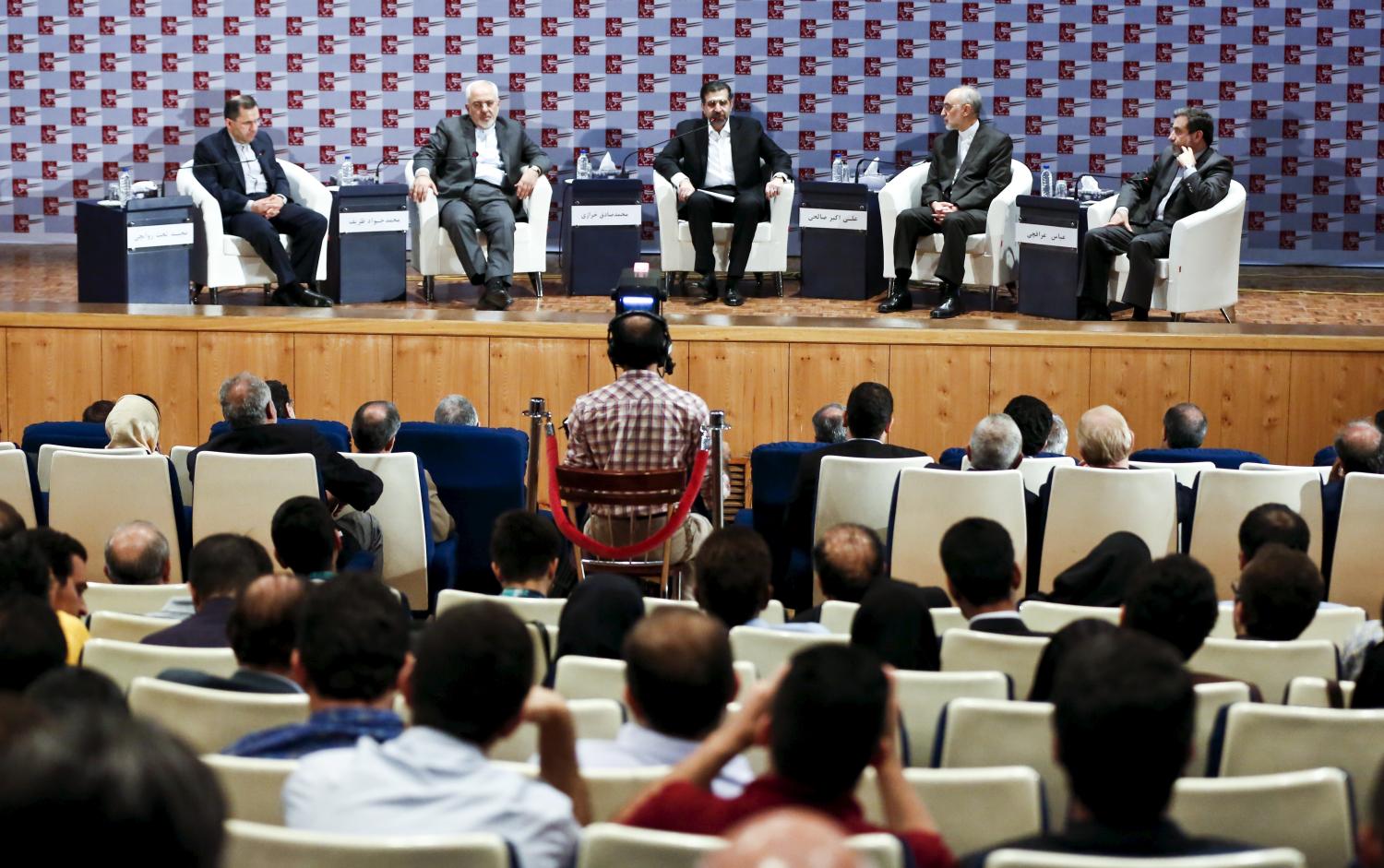
The difficulty Iran faces in re-integrating into the international financial system and receiving the foreign investments it needs cannot legitimately be blamed on the United States and its approach to sanctions relief. Instead, as former JCPOA sanctions relief negotiator Richard Nephew points out, the pace of economic recovery that Iranians find so disappointing can be attributed to a variety of factors, including: the continued low price of oil that undercuts revenues from increased export volumes; fear by major banks and businesses of running afoul of U.S. non-nuclear-related sanctions that the JCPOA left in place; uncertainly about the JCPOA’s longevity (due to leadership transitions in Washington or Tehran or the possibility of JCPOA-ending compliance disputes); bureaucratic and regulatory obstacles to doing business with Iran; warnings by the Financial Action Task Force of continued financial misconduct by Iran; and, in general, unfavorable risk/reward calculations by banks and businesses contemplating engagement with Iran.5
Iranian supporters of the Rouhani government and the JCPOA have acknowledged that Iran has slowly but steadily benefited from sanctions relief, touting such gains as 4.4 percent economic growth in the first quarter of the Iranian year and the restoration of oil exports to roughly pre-sanctions levels. They have also acknowledged that economic recovery will take a long time and that Iran bears responsibility for taking steps to put its own economic and financial house in order if it expects to capitalize on sanctions relief. But responding to the Iranian public’s frustration and to pressures from the deal’s opponents, even JCPOA supporters have publicly accused the United States of not meeting its commitments—of “oath breaking,” in the words of Foreign Minister Javad Zarif.
Uncertain future for the JCPOA. So, notwithstanding distorted attacks by American opponents and unwarranted Iranian accusations of U.S. violations, the parties seem to be living up to their JCPOA undertakings. Still, controversy surrounding the deal has not died down, and its future cannot be taken for granted.
American critics have focused heavily on post-JCPOA provocative Iranian activities that are not covered by the nuclear deal, arguing that the agreement has empowered the Iranians to engage in such activities and that sanctions relief has given them additional resources to do so. They cite Tehran’s heavy involvement in the Syria civil war in support of Bashar Assad; its assistance to Hezbollah in Syria and the Houthis in Yemen; its defiance of the Security Council’s call to cease missile activities; its continued detention of dual-nationals (despite the release of several Iranian-Americans in January); its crackdown on domestic dissent; its recent harassment of U.S. naval vessels in international waters; and strident rhetoric, especially by Ayatollah Khamenei, against the United States and Western influences. While there is little evidence that such provocations have been any greater than they would have been in the absence of the JCPOA, it is clear that any hopes that the JCPOA would moderate Iranian behavior, both externally and internally, have not materialized, at least so far.
Continued opposition to the JCPOA, primarily among congressional Republicans, has given rise to proposals for new Iran-related legislation. Ed Levine points out that new bills have been introduced to block dollar-denominated Iranian transactions, Boeing’s sale of commercial aircraft to Iran, U.S. purchases of Iranian heavy water, and the U.S.-Iranian claims settlement announced in January; to add new sanctions to punish Iran’s missile tests and support for terrorism; and to extend the Iran Sanctions Act (ISA) which is scheduled to expire at the end of 2016.6 While some proposed legislation has the backing of Democrats who support the JCPOA, most is designed to impede U.S. implementation and derail the deal. With 60 Senate votes required to debate a new bill and 67 required to override a presidential veto, there is little prospect that new legislation will be adopted this year, with the possible exception of a “clean” extension of the ISA (i.e., one that simply renews the existing law without incorporating controversial new provisions). Still, with opposition on the Hill sure to persist into 2017, the likelihood of killer legislation being adopted will depend largely on the complexion of the new Congress and Iranian behavior.
The 2016 presidential election is another source of uncertainty about the future of the JCPOA. Hillary Clinton would almost certainly preserve the JCPOA, but might be expected to take a tough approach both to enforcing the deal and to Iranian behavior outside the agreement. While candidate Donald Trump has opposed the nuclear deal and vowed to re-negotiate or withdraw from it, it is unclear what he would do as president, especially if he was unable to gain international support for the re-imposition of sanctions strong enough to compel Iranian acceptance of a new deal on terms he considered acceptable.
Future Iranian support for the JCPOA is uncertain as well. Iranian leaders, most notably Ayatollah Khamenei, are publicly threatening to scale back or terminate their own compliance with the deal unless the United States fulfills its sanctions relief commitments and encourages the international financial community to re-engage with Iran. We can expect that Iranian hardliners will continue to seize on the slow pace of economic recovery to argue that Iran is not receiving the benefits to which it is entitled under the JCPOA and to agitate for abandoning the agreement. Moreover, in the run-up to the May 2017 presidential election, the JCPOA will be a political football, with opponents of President Rouhani attacking the agreement as a way of undermining prospects for his re-election. And if Rouhani’s bid for re-election fails, his successor will almost surely be less committed to preserving the nuclear deal.
The JCPOA and the next U.S. administration
As part of its broad foreign policy review in early 2017, the new American administration will consider its approach toward the JCPOA and Iran. A threshold question will be whether the JCPOA is achieving what it was designed to achieve: preventing Iran from having the capacity to produce nuclear weapons for at least 10 to 15 years. On this, the answer, at least so far, is that the deal is working well. Iran’s nuclear capacity has been sharply reduced and Iran is living up to its nuclear commitments.
The reviewers might also ask whether the JCPOA should originally have addressed Iranian behavior outside the nuclear realm (e.g., regional and missile activities) and whether it should now be re-negotiated to broaden its scope and perhaps also to achieve more favorable terms on the nuclear issues (e.g., more stringent or longer-duration or even permanent constraints on enrichment and reprocessing). On the scope of the deal, the answer is that confining the agreement to the nuclear issue was justified—that eliminating the near-term nuclear threat was the most urgent priority and that differing views on Iran’s non-nuclear behavior, not just between Iran and the P5+1 but also among the P5+1, would have made a comprehensive deal impossible to negotiate originally and just as impossible today. But even though broadening the scope of the agreement to cover Iranian activities outside the nuclear realm is not realistic, the next U.S. administration should recognize that public support for the deal—and the ability to resist new legislation that could destroy it—would be seriously undermined if the United States is not seen as actively and effectively opposing egregious Iranian external or internal behavior.
Re-negotiating more favorable terms for the nuclear deal is as much an illusion today as it was in 2015, when congressional opponents called for rejecting the JCPOA and pressing Iran to accept a much more restrictive agreement. Back then, it became clear that there was no realistic alternative to the JCPOA. In the wake of its rejection, the United States would have had the worst of all worlds—Tehran would have been free to ramp up its nuclear capabilities and reduce its breakout time and Washington would no longer have been able to muster the international support needed for sanctions strong enough to compel Iran to accept terms more favorable to the United States than those contained in the JCPOA.
Re-negotiating more favorable nuclear terms today would be even harder than it would have been in 2015. Widespread complaints in Iran that it is not receiving the benefits of the JCPOA, however unjustified, would make it politically impossible for any Iranian government to make further concessions. And with America’s P5+1 partners all convinced that the existing deal is a success and working well, there is no possibility—short of major Iranian cheating or egregious Iranian external or internal behavior—that even the three European P5+1 countries would join the United States in seeking to re-impose and ramp up sanctions in the hope of getting a better deal.
[T]he best course for the new U.S. administration is to preserve the JCPOA. But it needs to recognize that continued compliance by Iran cannot simply be assumed.
So, the best course for the new U.S. administration is to preserve the JCPOA. But it needs to recognize that continued compliance by Iran cannot simply be assumed, that the expiration of key nuclear restrictions after 15 years will renew concerns about Iran’s nuclear ambitions, that even a successfully operating JCPOA will address only one dimension, albeit an important one, of the Iranian challenge, and that failure to address that broader challenge effectively will undermine the support in both the United States and among American’s Middle East partners that will be needed to sustain the nuclear deal over the long term. A sound U.S. strategy toward the JCPOA and the region would include the following elements:
Enforcing Iranian compliance. The United States should continue to firmly resist any efforts by Iran to weaken or evade its nuclear commitments, and it should reinforce international support for re-imposing sanctions in the event of Iranian non-compliance. When inevitable questions of interpretation (e.g., whether unrecoverable wastes should be counted against the enriched uranium ceiling) or inadvertent technical infractions (e.g., slight heavy water overage) occur, Washington should seek prompt, practical solutions that preserve the integrity of the agreement. While deliberations on sensitive implementation issues should be carried out in private, public confidence in the JCPOA could be strengthened by making information publicly available about Iranian-P5+1 agreements resolving consequential implementation matters.
Facilitating appropriate sanctions relief. Iran’s slow economic recovery is not the result of any U.S. failure to fulfill its JCPOA sanctions relief commitments. International banks and businesses are understandably cautious about re-engaging with Iran, and Tehran has failed so far to adopt the financial and bureaucratic reforms necessary to dispel their concerns. Moreover, the United States is justified in—and not precluded by the JCPOA from—continuing to enforce sanctions imposed for Iran’s support for terrorism, human rights abuses, and missile activities. Still, the United States has a stake in Iran continuing to fulfill its nuclear commitments, and if Iranians believe they are not receiving the benefits to which they are entitled, there is a risk they will stop fulfilling them. U.S. officials have already done much to help foreign banks and other entities understand the JCPOA’s treatment of sanctions relief and how they can avoid running afoul of remaining U.S. sanctions, but they can do more to reassure them. They can, for example, provide updated guidance on the due diligence that the United States expects foreign entities to practice in order to avoid inadvertently dealing with actors that could subject them to U.S. sanctions.7 At the same time, Washington and its P5+1 partners should warn Iran to stop making unfounded accusations that the United States is violating its sanctions relief commitments, which only fuel unwarranted opposition to the JCPOA within Iran and serve the goals of Iranians who want to abandon it.
Reducing the JCPOA’s “out-year” risks. A major concern with the JCPOA, held by many of its American supporters as well as its opponents, is that, when key restrictions on Iran’s enrichment and reprocessing capabilities expire after 10 and 15 years, Tehran will have the legal right to sharply ramp up its nuclear capacity, giving it the option to break out of its JCPOA and NPT obligations and move quickly to produce nuclear weapons.8 Working with its P5+1 partners, the United States should develop incentives and disincentives to encourage Iran to meet its civil nuclear energy needs without building an “industrial-scale” enrichment capability or at least not to build such a robust capacity without a pressing and demonstrable need. In the event that Iran nonetheless pursues programs that give it a rapid breakout capability, the United States should take steps to deter Iran’s leaders from exercising that capability. U.S. administrations should declare that it is U.S. policy to prevent Iran from acquiring nuclear weapons and that the United States is prepared to use military force, if necessary, to stop Iran from producing nuclear weapons. To demonstrate national unity and strengthen deterrence, Congress should adopt a standing Authorization to Use Military Force, which would authorize but not require military action in the event the president determines and provides evidence to Congress that Iran is breaking out and moving toward nuclear weapons.
Pursuing a dual-track regional strategy. To shore up support at home and abroad for the nuclear deal as well as to promote U.S. interests more broadly, Washington needs to step up to the regional challenge posed by Iran. That means maintaining a formidable U.S. military and diplomatic presence in the Middle East, strengthening security ties with Gulf and other partners, working to constrain and defend against Tehran’s missile and other conventional military capabilities, and countering Iran’s efforts, directly and through proxies, to interfere in the affairs of its neighbors and tip the regional balance in its favor. At the same time, while U.S.-Iranian relations are likely to remain adversarial for years to come, the United States should maintain and expand lines of communication that the nuclear deal has opened, engage Iran in areas of potentially converging interests, encourage Iran to play a constructive role in resolving regional conflicts, and urge Iran and Saudi Arabia to find ways to tamp down their disputes and eventually reach an accommodation.
Reducing prospects for proliferation in the Middle East. A JCPOA perceived to be operating effectively as a barrier to a nuclear-armed Iran and sustainable over the long term will reduce incentives for other states of the region to pursue nuclear weapons or hedge their bets by acquiring enrichment or reprocessing capabilities. In addition, the United States should seek broader acceptance, regionally and globally, of some of the JCPOA’s innovative IAEA monitoring measures, encourage regional states to meet their civil nuclear energy needs without building indigenous fuel cycle facilities, urge other nuclear suppliers not to engage in sensitive nuclear cooperation with Middle East countries, promote regional or sub-regional arrangements that could head off competitive fuel cycle developments (e.g., a reprocessing ban in the Gulf area), and reassure regional partners that they can count on U.S. security assurances and need not pursue their own nuclear weapons.
-
Footnotes
- Regarding enrichment, the JCPOA called for a two-thirds reduction in Iran’s installed centrifuges (to a ceiling of 5,060 first-generation machines operating at the Natanz enrichment facility); a 98 percent reduction in stocks of low enrichment uranium (to a ceiling of 300 kilograms); a ceiling on enrichment at the level of 3.67 percent; a ban on enrichment at the Fordow enrichment facility; and strict limits on research and development for advanced centrifuges. Regarding reprocessing, the JCPOA called for the re-design of the Arak heavy-water reactor to sharply reduce the amount of plutonium produced; the shipment of Arak’s spent fuel out of Iran; a ceiling of 130 metric tonnes on heavy water; and a ban on building any additional heavy-water reactors or a reprocessing facility. Several of the restrictions on enrichment will expire after 10 years and the remaining restrictions on enrichment and reprocessing will expire after 15 years.
- While several monitoring measures lapse after 15, 20, or 25 years (e.g., daily IAEA access to Natanz, special inspection procedures, continuous monitoring of excess centrifuges, monitoring of centrifuge rotor tubes and bellows), Iran’s adherence to the IAEA Additional Protocol is permanent.
- U.S. sanctions imposed for non-nuclear reasons (e.g., support for terrorism, human rights abuses, ballistic missile activities) are not covered by the JCPOA and can remain in place or even be expanded.
- David Albright and Andrea Stricker, “JCPOA Exemptions Revealed,” Institute for Science and International Security, September 1, 2016, available at http://isis-online.org/isis-reports/detail/jcpoa-exemptions-revealed.
- Richard Nephew, “Six Months Later: Assessing the Iran Nuclear Deal,” Center on Global Energy Policy, SIPA, Columbia University, July 2016, available at http://energypolicy.columbia.edu/publications/report/six-months-later-assessing-implementation-iran-nuclear-deal.
- Edward P. Levine, “Under the Big Top: Congress and the Iran Nuclear Agreement,” in JCPOA: One Year Later, Center for Strategic and International Studies, https://www.csis.org/programs/international-security-program/proliferation-prevention-program/iran/jcpoa-one-year-later.
- See Elizabeth Rosenberg and Richard Nephew, “Iran’s Broken Financial System,” Politico, June 6, 2016, available at http://www.politico.com/agenda/story/2016/06/iran-broken-financial-system-000139. Also see Richard Nephew, written testimony before the Senate Foreign Relations Committee on “The Iran Nuclear Agreement: One Year Later,” July 14, 2016, available at https://www.foreign.senate.gov/hearings/the-iran-nuclear-agreement-one-year-later-071416p.
- The JCPOA’s restrictions on Iran’s enrichment capacity increased from 2-3 months to about a year the time it would need to break out of the agreement and produce enough highly enriched uranium (HEU) for a single nuclear weapon. However, as those restrictions expire—in years 8, 10, and 15—Iran will have the right to increase its enrichment capacity and eventually (perhaps after year 13) have the ability to produce enough HEU for a single bomb in a matter of weeks. As a result, critics of the JCPOA say it only defers but does not prevent an Iranian nuclear weapons capability. Supporters point out that, even after 15 years, Iran will be legally bound not to produce nuclear weapons and that it will still be subject to intrusive monitoring that would alert the United States and others to an Iranian breakout attempt and give them an opportunity to intervene, if necessary with military force, to prevent it from succeeding.
The Brookings Institution is committed to quality, independence, and impact.
We are supported by a diverse array of funders. In line with our values and policies, each Brookings publication represents the sole views of its author(s).

